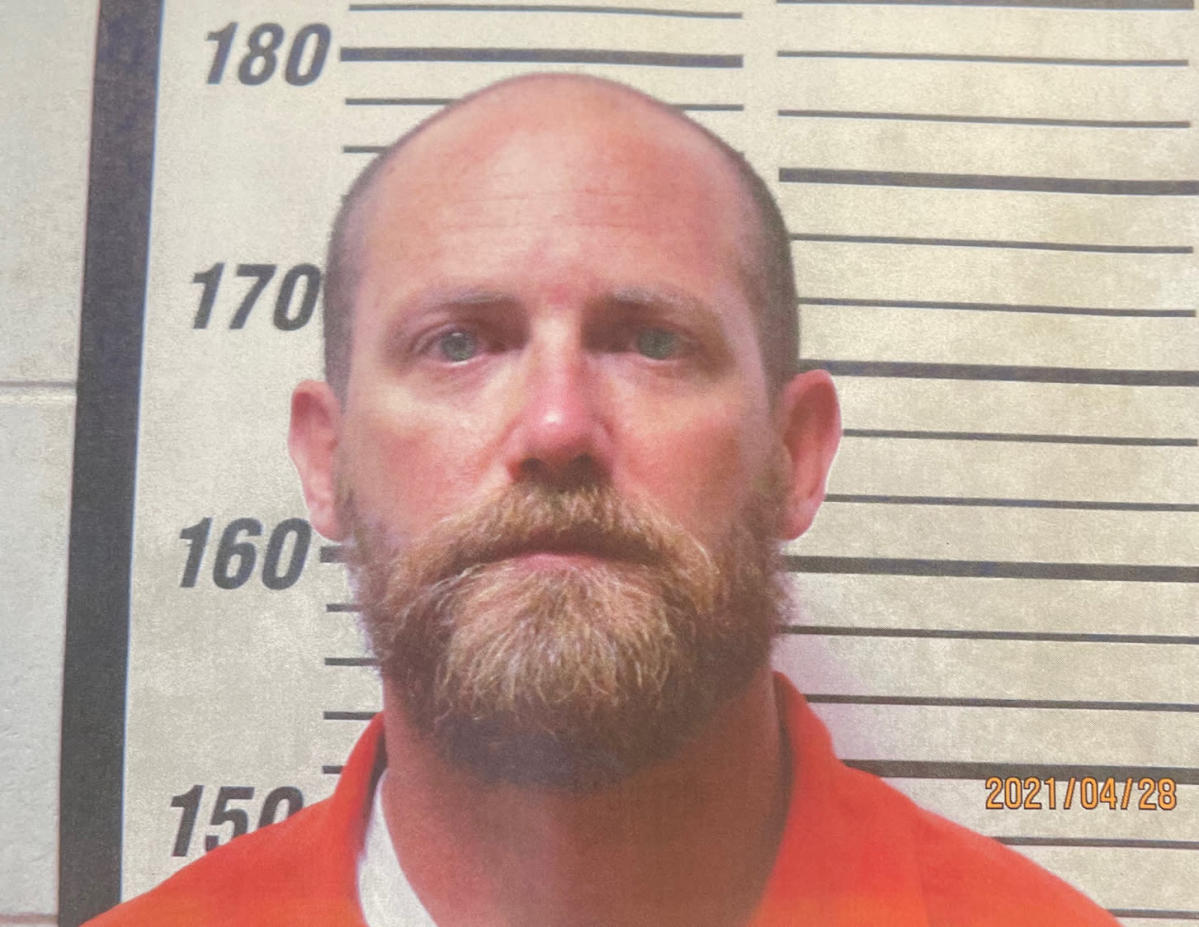
CRYSTAL SPRINGS, Miss. (AP) — U.S. Drug Enforcement Administration Agent Harold Duane Poole was waiting with his semiautomatic service rifle — and an explanation — when deputies arrived at his sprawling wooded property on a warm spring night last year and found a bullet-riddled body near the driveway.
A veteran of the DEA’s military-style commando teams, Poole acknowledged he fatally shot a mentally ill neighbor just minutes after calling law enforcement to report the man was trespassing on his land – yet again – “out of his mind” and threatening him with a rock.
“I’m going to kill you!” Poole recalled Chase Brewer yelling before he responded by firing eight high-powered rounds, striking the man in the chest, gut and hip.
Sheriff’s investigators were skeptical of Poole’s self-defense claim from the start, reports show, mostly because he mentioned in his call for help that the trespasser was already leaving. No rock of any kind could be found. And the shooting happened 200 yards from Poole’s house, near the edge of his property, prompting deputies to determine Mississippi’s “castle doctrine” didn’t apply.
Yet a little more than a year after Poole was arrested on a murder charge in the April 27, 2021, shooting, he has quietly returned to work as a supervisor in the DEA office a half-hour’s drive north in Jackson after a grand jury this spring declined to indict him.
What happened with the case amid the farm fields and pastures of Mississippi has baffled and frustrated the slain man’s family, and it’s something neither local prosecutors, the DEA nor Poole himself would discuss. But interviews and hundreds of law enforcement records obtained by The Associated Press raise new questions about the justification for the shooting, how Poole avoided trial and whether DEA brass overreached to protect one of their own amid a flurry of misconduct cases in the agency.
“No citizen could have done what this DEA agent did and walked away,” said W. Lloyd Grafton, a use-of-force expert who reviewed the investigative case file at AP’s request.
Former DEA supervisors who examined the case for AP questioned the agency’s heavy-handed involvement in the critical first hours, even though the shooting had no nexus to federal law enforcement and Poole had been off duty feeding his chickens when he first spotted the trespasser.
Multiple DEA agents responded to the crowded crime scene and one supervisor declared himself “in charge” and blocked state and local investigators from interviewing Poole for at least 48 hours, citing an unspecified policy, the law enforcement records show. Later that night, the DEA’s ranking official in New Orleans called the local sheriff after deputies decided they would arrest Poole. But by that time, the federal lawman had already left the scene to seek medical treatment for being “shaken up” — telling DEA officials but not local authorities.
“They tried everything they could to get us not to charge him,” Copiah County Sheriff Byron Swilley told the dead man’s family the day after the shooting, according to a recording of the private conversation obtained by the AP.
“I done had people calling me all out of Virginia about this guy because he’s an agent,” he added, referring to DEA headquarters.
Deputies charged Poole anyway, the sheriff explained, because it was obvious the agent failed to wait for law enforcement to arrive and “took the law into his own hands.”
“When it’s wrong, it’s wrong,” Swilley added. “You take somebody’s life because of a rock?”
Hours after the shooting, the U.S. Justice Department issued an internal determination that Poole was not acting in the line of duty and DEA should defer to local authorities, according to current and former law enforcement officials familiar with the case.
A former ranking DEA official said the agency was nonetheless able to show its interest in the case and have an effect.
“You just had DEA impeding and obstructing a local investigation,” said Karl C. Colder, a former DEA special agent in charge who also served as the agency’s deputy chief inspector.
The DEA did not respond to repeated requests for comment. The Justice Department declined to comment.
Poole’s shooting case followed a series of misconduct scandals that have dogged the DEA for years.
Just weeks before, DEA brass responded to a separate controversy involving another off-duty agent, Mark Ibrahim, who posed for photos in which he flashed his DEA badge and firearm outside the U.S. Capitol during the Jan. 6 riot. Ibrahim is awaiting trial on four federal counts.
And only months before that case, a once-standout DEA agent admitted conspiring to launder money with a Colombian drug cartel. Jose Irizarry was sentenced to 12 years in federal prison, joining a growing list of former agents behind bars.
Poole, 48, has been held in high regard in DEA for more than two decades, serving as group supervisor in the agency’s Jackson District Office, which targets major drug trafficking cases in 32 counties in Mississippi.
Beginning in 2013, Poole traveled the world with DEA’s Foreign-Deployed Advisory and Support Teams, the military-style commandos that battled drug traffickers in Afghanistan and Latin America. The so-called FAST teams were disbanded in 2017 after coming under criticism for a series of fatal shootings in Honduras that predated Poole’s overseas service.
Poole chronicled some of his adventures on Facebook, sharing photos of himself in combat gear. One showed him firing an assault-style rifle somewhere in South America. “This has been without a doubt the most rewarding period of my 21 year career,” he wrote in a late 2016 post before returning home to his family in Mississippi.
Poole and his neighbor Brewer, or the “guy across the street,” as the agent once described him, had known each other for years and were once on such good terms that Poole invited Brewer to his cookouts.
But by the time of the shooting, bad blood had been building for months. Brewer repeatedly trespassed onto Poole’s 9-acre property and even attempted breaking into the home through a bedroom window in September 2020, prompting Poole to draw his pistol, according to charging papers.
Brewer was rambling incoherently by the time deputies arrested him emerging from a creek, armed with a pistol and two pocket knives.
An avid outdoorsman and truck mechanic who lived in a trailer, the diminutive, 47-year-old Brewer was also regarded by those close to him as a miracle of modern medicine. In 1996, he received a five-organ transplant at the University of Pittsburgh that replaced his stomach, duodenum, pancreas, intestine and liver after suffering intestinal failure due to a hereditary defect.
But Brewer began spiraling following a stroke in 2019, said his mother, Andrea Breedlove. He was hearing voices, and his drug use expanded from marijuana to crystal meth. In the months before Brewer’s death, his mother tried to have him committed but was told the University of Mississippi Medical Center didn’t have enough beds.
“Chase had been a good, quiet neighbor for years — and then he changed,” Breedlove said in an interview at her home. “He would hallucinate at times and talk to people who weren’t there. He needed help.”
Poole, meanwhile, grew increasingly concerned for his family’s safety, and he was frustrated that his pleas to local law enforcement were going unheeded. In October 2020, a month after the attempted break-in, the agent’s wife told deputies following yet another trespassing incident that Brewer had a habit of sneaking onto the property when Poole was away. Brewer, who in this instance was chased away by Poole’s dog, falsely told the deputy taking him into custody that he was a law enforcement agent who “cannot be arrested,” according to sheriff’s records.
So it didn’t take long for Poole to recognize Brewer walking up his driveway that fateful night in April 2021. At 6:57 p.m., Poole called the Copiah County Sheriff’s Office non-emergency line to report the trespassing and request a deputy.
“Mr. Poole said that he went inside and got his rifle and when he came back out Chase Brewer was leaving,” according to a sheriff’s report.
The agent followed Brewer toward a roadway abutting his pasture, flashed his badge and ordered him to the ground. Instead, Poole told deputies, Brewer hurled a rock and said, “I’m going to kill you!” That’s when Poole raised his AR-15-style rifle and fired.
Three minutes after his initial call, Poole phoned the sheriff’s office again to report he shot Brewer because he had charged at him.
“Mr. Poole said that Chase Brewer was out of his mind and that he is always shooting guns just down the road at his trailer,” the sheriff’s report says. An autopsy detected meth in Brewer’s system, a drug he was also carrying at the time of his death.
Even after arresting Poole, deputies acknowledged they did not know the full extent of the encounter, in part because the agent never provided a full statement.
Also, some members of state law enforcement second-guessed Poole’s arrest. A Mississippi Bureau of Investigation agent, Dennis Weaver, told a judge in a preliminary hearing that he disagreed with the sheriff’s decision to arrest Poole, even though he acknowledged he had not reviewed critical body-camera footage of the agent’s statements to deputies at the scene.
It’s unclear why the grand jury rejected the state’s murder case, despite the sheriff’s assurances to the Brewer family that he would seek “real justice.”
The local district attorney, Daniella Shorter, would not talk about her handling of the case, and neither her office nor the sheriff would release the body-camera footage, citing an investigation of the case by the Justice Department’s Office of Inspector General.
“To release it to the public would be counter to their efforts in the event of a prosecution by the federal government,” said Elise Munn, a Copiah County prosecutor. The Office of Inspector General declined to comment.
For Brewer’s family, the loss of a loved one has been compounded by the lack of answers. At the very least, they want Poole to offer an apology or condolences for his neighbor’s death. But the agent, like the DEA, has remained silent.
“He wanted Chase dead, that’s all there is to it,” said Breedlove, Brewer’s mother. “This wasn’t David versus Goliath. What was he going to do with a rock?”
___
Contact AP’s global investigative team at Investigative@ap.org or https://www.ap.org/tips/




